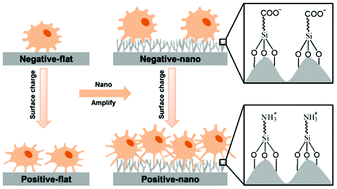Nano-biointerfaces with varied surface charge can be readily fabricated by integrating a template-based process with maleimide–thiol coupling chemistry. Significantly, nanostructures are employed for amplifying the effect of surface charge on cell adhesion, as revealed by the cell-adhesion performance, cell morphology and corresponding cytoskeletal organization. This study may provide a promising strategy for developing new biomedical materials with tailored cell adhesion for tissue implantation and regeneration.

